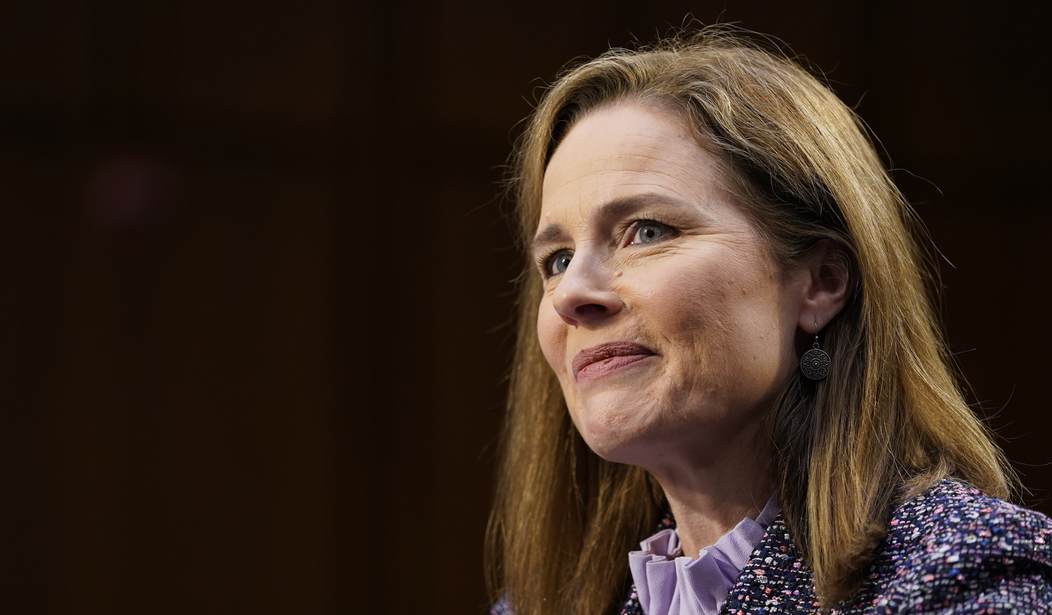Women could be sentenced to death for abortion if Amy Coney Barrett is confirmed, according to one Vanity Fair writer.
The Senate plans to vote to confirm Judge Barrett to the Supreme Court on October 26. In anticipation, Vanity Fair condemned President Trump’s nominee for seeing “a scenario in which abortion should be punishable by death.” In a recent piece riddled with errors, politics correspondent Bess Levin went so far as to argue that Barrett’s confirmation means that women will be “executed” for “choosing what to do with their own bodies.”
“The defining feature of Amy Coney Barrett’s Supreme Court confirmation hearing was her refusal to answer a single question that might actually reveal her opinion,” Levin began on October 23.
She took particular interest in Barrett’s position on abortion.
In addition to her record on abortion-related cases, Barrett once “wrote in one court opinion that the procedure is ‘always immoral,’” Levin warned.
What Barrett actually said is a little different: That the Catholic Church recognizes abortion to be “always immoral.” In the link from 2017 that Levin provided as evidence, Barrett clarified that she “recounted the Catholic Church’s teaching that ‘abortion . . . is always immoral’” in the article in question, which she co-authored.
Furthermore, Barrett assured, “my views on this or any other question will have no bearing on the discharge of my duties as a judge.”
Listing her grievances, Levin also complained that Barrett “signed a letter calling for the end of the ‘barbaric’ Roe v. Wade,” the 1973 Supreme Court case that legalized abortion nationwide. It’s a claim that National Review senior editor Ramesh Ponnuru debunked earlier in October, after speaking with leaders of Right to Life Michiana, formerly St. Joseph County Right to Life.
For his part, Ponnuru acknowledged that Barrett signed a statement in 2006 reading, “We, the following citizens of Michiana, oppose abortion on demand and support the right to life from fertilization to natural death.”
Recommended
This “insert was placed by St. Joseph County Right to Life,” he wrote. While it “appeared next to anti-Roe v. Wade commentary from the organization” – the commentary that Levin referred to – the “signatories were asked only to approve the statement.”
But Levin only moved on to her central focus: one of Barrett’s recent “nonanswers to a written follow-up question” from Senator Sheldon Whitehouse (D-RI), which she found “extremely chilling.”
The senator’s question read, “Under an originalist theory of interpretation, would there be any constitutional problem with a state making abortion a capital crime, thus subjecting women who get abortions to the death penalty?”
In her answer submitted on October 16, Barrett responded, “Please see my answer to Question 100,” which read, “As a sitting judge and as a judicial nominee, it would not be appropriate for me to offer an opinion on abstract legal issues or hypotheticals.”
Barrett provided her reasoning for these “nonanswers,” as Levin called them.
“Consistent with the practice of other sitting judges and nominees, I have discussed my judicial philosophy during my hearing and in response to these written questions, subject to the limitations imposed by the Code of Conduct for United States Judges,” Barrett wrote in response to another question. “As Justice Kagan explained, it is not appropriate for a judicial nominee to ‘grade’ or give a ‘thumbs-up or thumbs-down’ to particular cases.”
“It would be inappropriate for me to give my personal views,” she urged at another point, “because I would not want any litigant to have the misimpression that my personal views would have any effect on my legal rulings.”
She also referenced the “Ginsburg Rule,” established when the late Justice Ruth Bader Ginsburg was a nominee in 1993. Her rule of “no hints, no previews, no forecasts,” “applies to nominees for judicial office,” Barrett wrote.
Some in the media agree. Earlier in October, New York Times Supreme Court Reporter Adam Liptak confirmed that “Judge Barrett’s stance was in line with the approach of nominees since Judge Robert H. Bork’s answers at his 1987 confirmation hearings helped doom his nomination.”
But, according to Levin, Barrett’s “nonanswers” are unique to Barrett.
“Obviously, claiming that she can’t answer hypothetical questions has been Barrett’s schtick throughout this entire process and, in some instances, it might actually be appropriate to say as much,” Levin complained. “But not when the question is ‘can a state sentence a woman to death for getting an abortion,’ unless of course she thinks there might somehow be a scenario in which the answer is yes!”
In other words, Barrett’s silence meant affirmation.
“Barrett is expected to be confirmed for a lifetime appointment to the highest court in the land,” Levin warned, “barring something crazy happening like ‘moderate’ Republicans thinking maybe women shouldn’t be executed for choosing what to do with their own bodies.”
Levin’s twisting of Barrett’s position does a great disservice to herself and her readers by spreading misinformation and mischaracterizing the legal and pro-life spheres.
Yes, Amy Coney Barrett appears pro-life down to the very way that she lives her own life. But the pro-life movement stands for loving the unborn and their mothers. National pro-life leaders reject punishment for women who seek abortion, including Marjorie Dannenfelser of the Susan B. Anthony List, who stressed in 2016 that “punishment is solely for the abortionist who profits off of the destruction of one life and the grave wounding of another.” It’s the pro-life movement that cares for post-abortive women, with ministries like Rachel’s Vineyard and Silent No More Awareness.
That’s because the pro-life movement values the intrinsic worth of the human person from the moment of conception – and it takes the destruction of life seriously. Levin should too.

























Join the conversation as a VIP Member